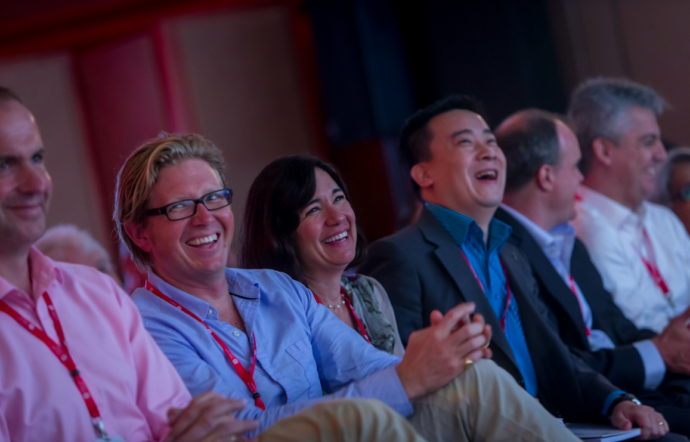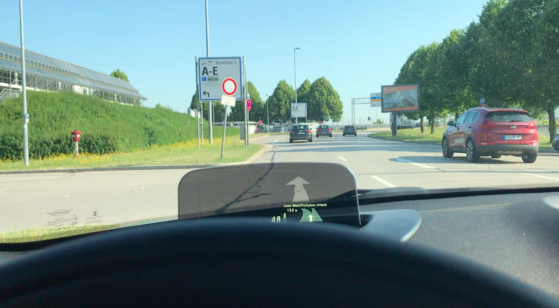We have all heard of the curse of “Writer’s Block” that happens to authors, but does something similar happen to speakers?
I believe that it does, and I call it “Speakers Block”.
Writer’s block is defined as: “the problem of not being able to think of something to write about or not being able to finish writing a story, poem, etc.”
“Speaker’s block” I want to define as: “the problem of delivering a bad speech even after having delivered hundred’s or thousands of speeches successfully before.”
Just as writer’s block is a curse, so is speakers block.
I know, because I just suffered from it a couple of days ago.
I was booked to deliver a speech for APSS (AsiaSpeakers.org) about how to craft a keynote and managed to fail in my delivery.
(Yes, I am fully aware of the irony of suffering from speaker’s block while delivering a speech about speaking to speakers…. ;-D
Here is what happened and why.
1) How I crashed.
– I was unable to build an affinity with the audience and to create a close and personal emotional connection (Which again is ironic since many of the people in the audience were actually my friends.)
Therefore I was not able to get my message across in an inspirational way.
2) Why it happened.
Speaker’s Block happens for a number of reasons, mostly because:
a) You are not prepared
b) You become distracted
c) You are not reading the audience well
d) You are not physically or mentally in shape
e) You are not mentally there
f) You are nervous
g) You want it too much to be a success
h) You do not believe what you are saying – or not saying what you believe
In my case it was a combination of b) and d) which led to e). But it was also a bit of g) and h)
b) Being distracted.
For this event I was both the speaker and the organiser. That meant that apart from having thoughts in my head about delivering a great speech, I was also pre-occupied with questions about creating a great event. (Mental note: never organise an event if you are the speaker. 😉
Having an internal conversation with myself about the event itself distracted me from connecting with the audience and from focusing on delivering an inspiring message.
d) Not physically or mentally in shape.
I normally make it a habit to make sure I am well rested, not thirsty or hungry and that I have no distraction or negative thoughts in my head on the day of a speech. For this particular speech I had not been able to clear my head from some bad news earlier in the day which made my state of mind affect my mood, something that in turn led to me not being able to be fully present at the event.
The result was a speech delivered in an inauthentic way with me being a bit out of tune with the audience.
g) You want it too much to be a success.
As much as it might sound like an oxymoron for non-speakers it seems to me that the more you want your speech to be a success the higher the likelihood that it will led to speaker’s block. Thinking in perspectives of “success” or “me” makes you overthink the delivery and moves the focus from “what is the message these people need to hear?” to “How can I do this in the best way possible.” A speech is never about you – not even in the context of “how can I make this great?”
h) Do not believe what you are saying
I am right now in a process of re-evaluating my speaking topics and planning a new topic to speak on. Delivering a speech on what I have been doing when I am in the middle of thinking about where I want to go created a dis-connect between my message and me, which in turn added an layer of inauthenticity.
3) How to get out of it.
a) Take a break. The last two days I cleared my calendar of all my meetings and to-do’s. Instead I spent most of my time in the Botanic Garden of Singapore, walking around in nature and reconnecting with reality. I also spent a lot of time with my family. The trick is to remind yourself of what is truly important in life, to get perspective and to remind you that “it was just a speech”.
b) Seek the advice and guidance of trusted advisors.
I have also reached out to some my fellow speakers whom I trust and respect the most to get wise advice on what went wrong and how to “re-connect” with the deeper reasons why I speak.
c) Get up on the horse again. On Monday I am giving a similar speech to the a group of other speakers and the feeling of revenge will push me make that a much better speech. The best medicine against a bad speech is to do a good speech next time. (and thankfully speaker’s block tends not to last for a long time.)
Some might feel that mulling over one (unpaid) speech for two days is over-reacting, but the way I feel it failing at a speech doesn’t pull you down a few notches, it pulls you down to 0. It’s closer to losing your grip while free climbing than it is to stumbling: you fall all the way down.
Some may also add: “You are being too hard on yourself, I am sure it was not that bad.” But if you want to be a global professional speaker you can not accept anything but world class. If the audience is not coming up and saying “that was one of the best speeches I have ever heard” then the speech was bad. I know that might sound harsh, but that’s how this industry works. People who book professional speakers want the best, and if you are not the best you will quickly loose out on these bookings
After speaking for 20+ years I can happily report that speaker’s block seems to be quite rare. I would say that perhaps 1-2% of the speeches I deliver I personally feel that I failed, either partly or fully.
That might sound like a lot, but thankfully you do not crash every time you suffer from speaker’s block, most of the times the result is just a “rough landing”. By that I mean that the audience do not feel that you suffered from speaker’s block, but you know. The “crashes” are when the audience also can feel it.
How can you tell if the audience noticed?
– They come up and thank you for your speech with words, but not with their eye.
– You do not get anyone coming up and asking to book you for a new assignment right after the speech.
– and the, oh, so dreaded question: “So how do YOU think it went?” (When the client or someone from the audience it turning the job of evaluating the speech back to you you know you have crashed….)
I know hundred’s of speakers and it seems that almost all professional speakers have the experience of “crashing” once in a while.
Like me, the other day.
(I know of one speaker who claims that he has never failed in a delivery over a 20 year speaking career, but I think that is more a sign of an inability to see reality, than a fact …)
The funny thing is that it is my experience that speakers with the longest careers and most extensive experience STILL fail once in a while. In my case I have done 2000 speeches and yet I fail once in a while. I think we just have to accept it as an occupational hazard … (Just like very experienced artists can do a bad concert once in a while, or a great writer will sometime not be able to write great stuff for a while.)
I am writing this post as inspiration to other speakers. I want us to acknowledge that while the job of being a professional speaker might look easy at first glance (“Just go up and speak for a while”), we can – and shall not – assume that we can just expect to go up and deliver a stunning speech time after time. We are only a few moments away from failing. And when we do we are humbly reminded about being human.
The “professional” part of “professional speaker” is our ability to learn from our mistakes, never stop to improve, and constantly re-evaluate our speaking skills.
That’s what I have been doing for the last couple of days. Soon time to get up on the horse again. Next time in Hong Kong.








